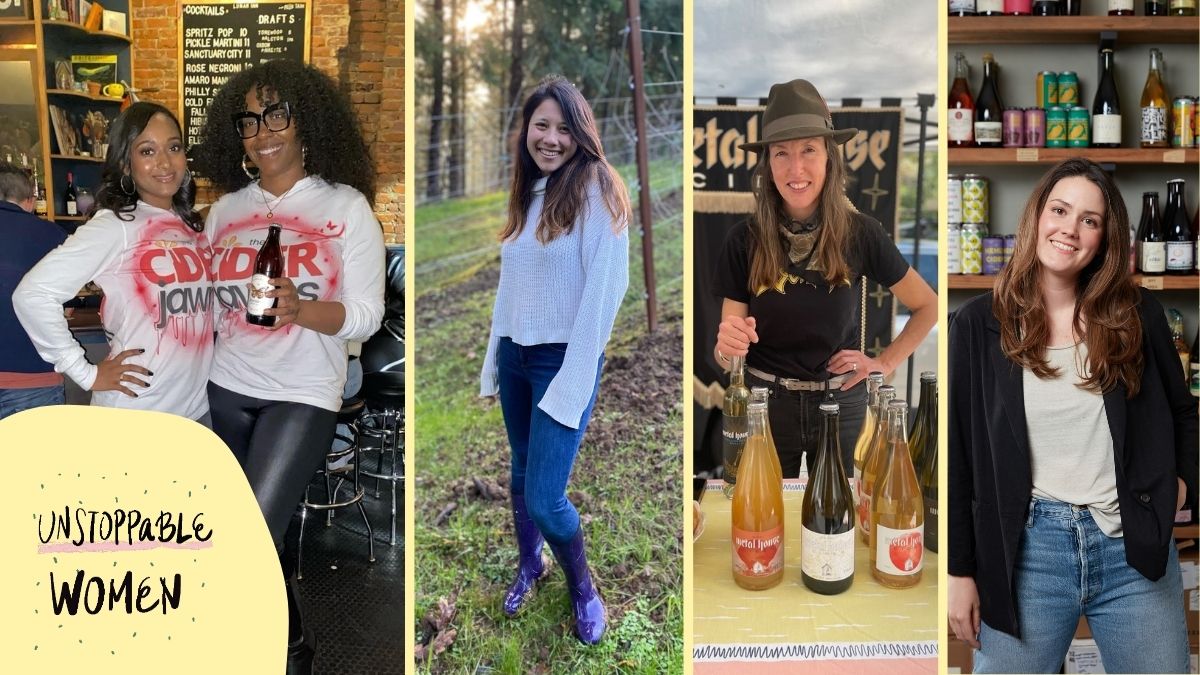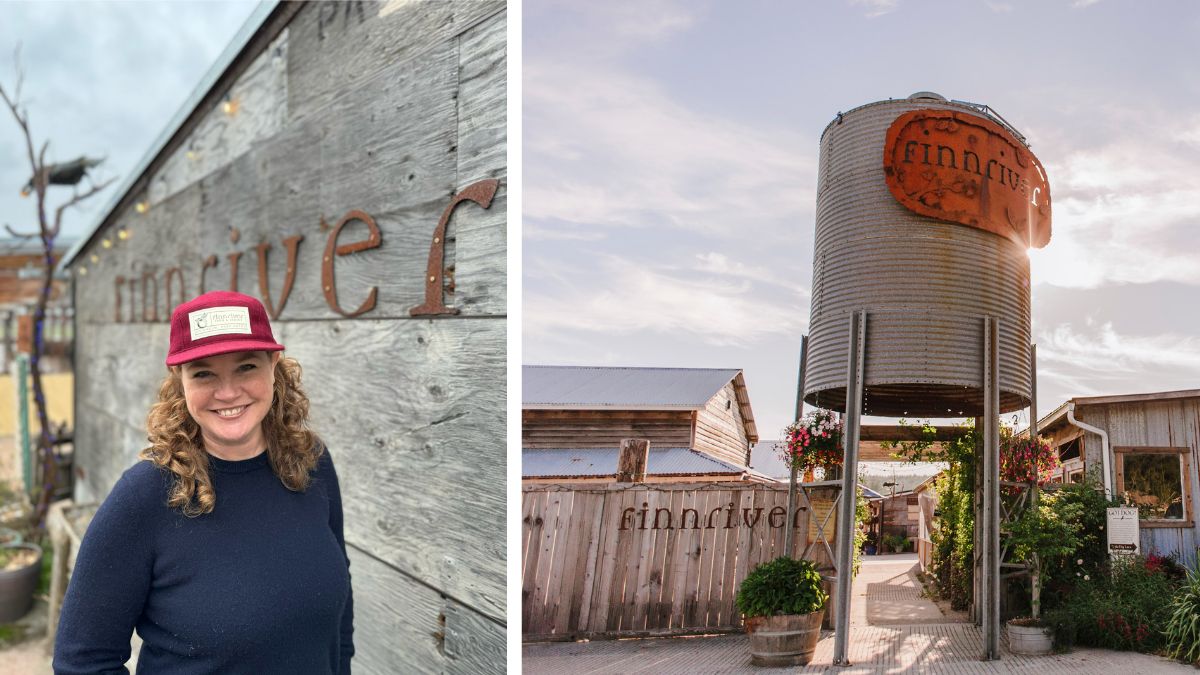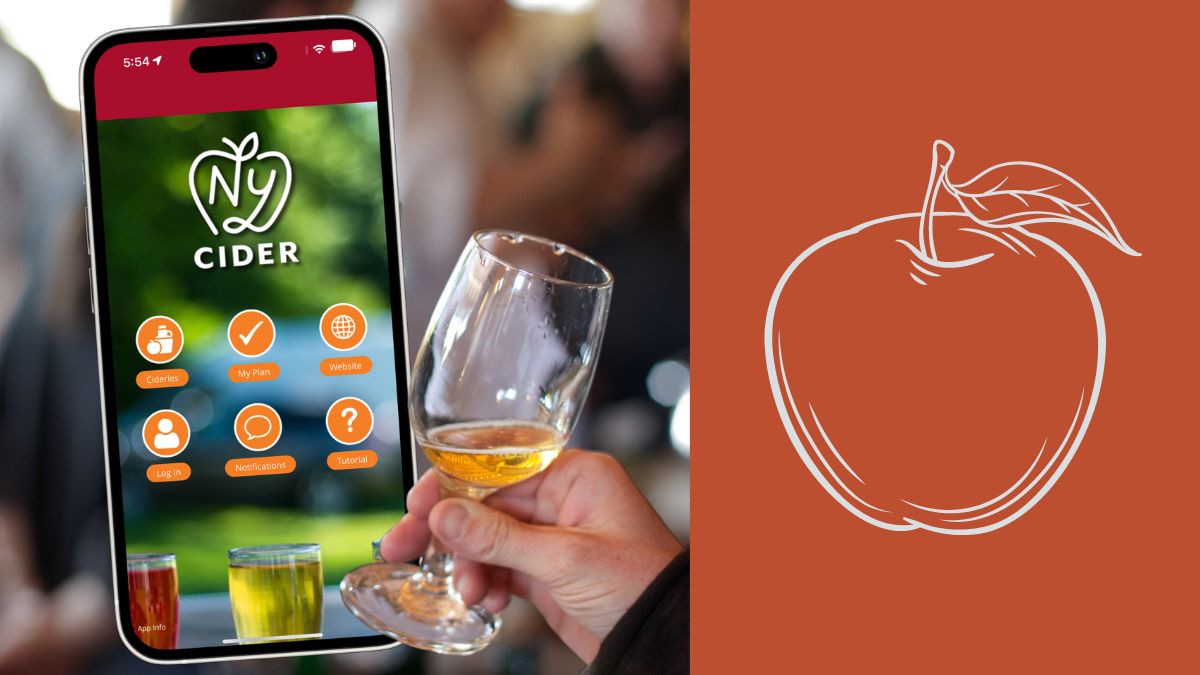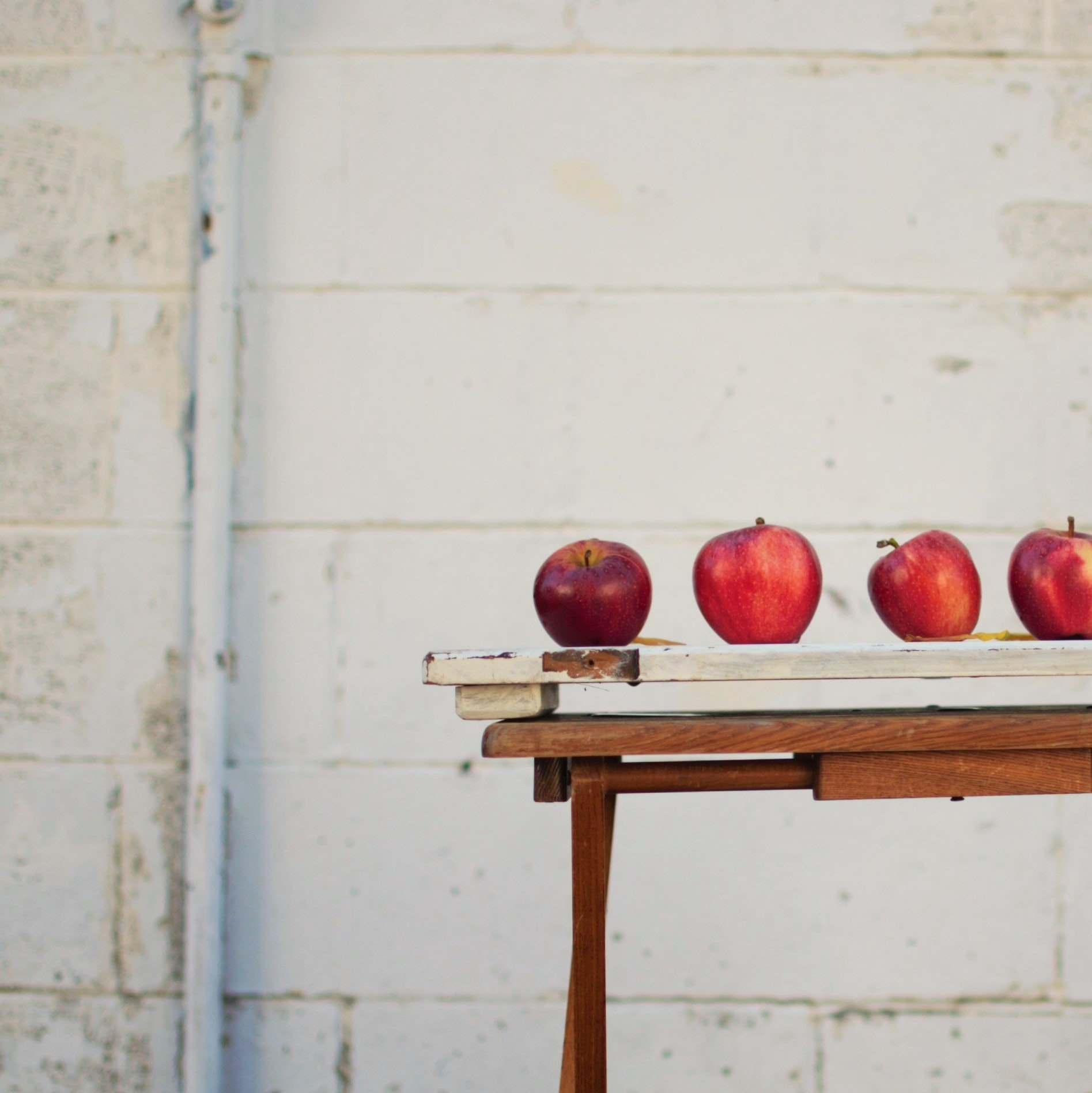How Five women across the United States are reshaping the cider scene
Women continue to move the cider industry forward, making it better, more creative, more resilient. In honor of Women’s History Month, Cidercraft spoke to five of the changemakers — from orchardists to storytellers — about how they’re reshaping the cider scene.
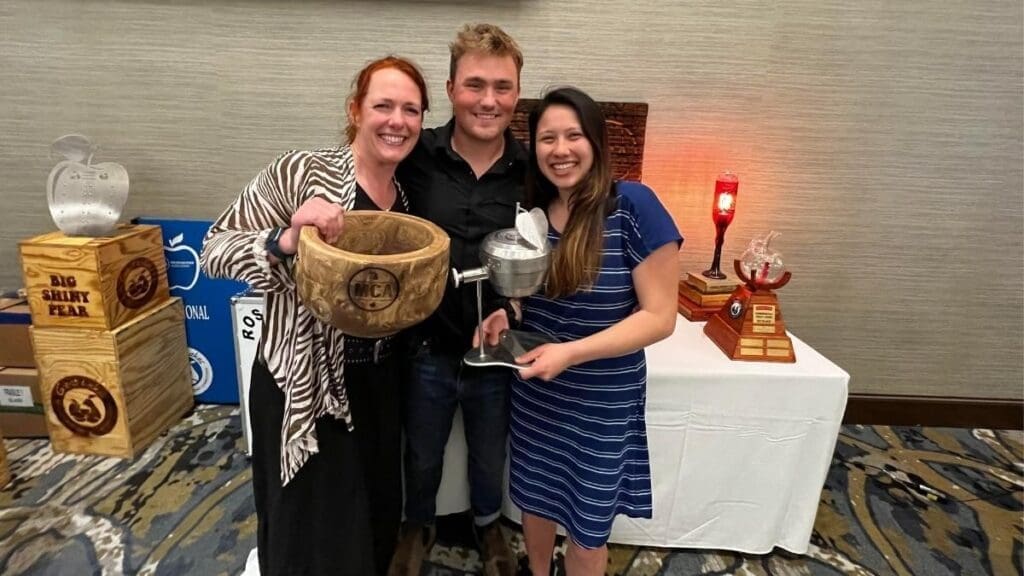
Left to Right: GLINTCAP Christine Walter, Adam Harper, and Caroline Kristof
Caroline Kristof: Cider Collaborator
In Yamhill, Oregon, Caroline Kristof and the Kristof Farms Cider team are turning heads with award-winning estate ciders, and Kristof’s successful approach often includes working with esteemed cidermakers. As general manager of multigenerational Kristof Farms, Kristof helped transform her family’s cherry orchard into a cider apple orchard and vineyard, and in 2021, the farm released its first small-batch cider, the 2020 Orchard Cider. A blend of eight cider apples, the debut was produced and bottled by Reverend Nat’s Hard Cider in Portland, Oregon. Kristof says Reverend Nat owner and cidermaker Nat West is an ongoing mentor, but that in 2022, for the farm’s second harvest, she wanted to expand her knowledge by collaborating with someone with specific experience growing apples like the ones her farm now produces and plans to grow more of.
So in 2022, for the second harvest, Kristof partnered with Christine Walter, owner and cidermaker at Bauman’s Cider, a family farm turned acclaimed cidery — the same trajectory Kristof envisions for her venture. Together, the pair created three new traditionally fermented ciders: a 2021 take on the original Orchard Cider, a small-batch Petillant Cider — both made entirely with estate fruit — and the 2021 Reserve Cider, comprising estate fruit blended with Vermont-based Eden Specialty Ciders’ Heirloom Ice Cider. Kristof and Eden co-founder Eleanor Leger hit it off when they met at CiderCon: “She opened my world to the magic of blending with ice cider, which preserves the intensity and complexity of flavors, maintains a high ABV, and softens the tannins of an oak-barrel age,” Kristof explains.
That same year, both the 2021 Reserve Cider and the 2021 Orchard Cider earned coveted GLINTCAP awards. “We were just so excited to be winning such prestigious cider awards next to some of the most talented and acclaimed cidermakers in the U.S.,” says Kristof, largely crediting the win to the fruitful collaboration with Walter.
With an eye toward the future, Kristof has plans to grow as much fruit — and therefore produce as much cider — as possible on her farm. “Every year our orchard is going to basically triple production,” she says. Eventually, Kristof wants to bring full production on-site and open the farm to visitors. In the meantime, however, even the apples are getting in on Kristof’s knack for advantageous cooperation: “This year we will be releasing a cider co-fermented on our estate Pinot Noir skins!”
Caroline Kristof’s Pick: Kristof Farms Cider’s 2021 Orchard Cider
Kristof says this cider is most representative of the farm’s terroir because it’s nothing but estate apples blended and fermented until dry: “We tried the orchard cider and decided that it was perfectly balanced the way it was and we didn’t need to blend it with anything
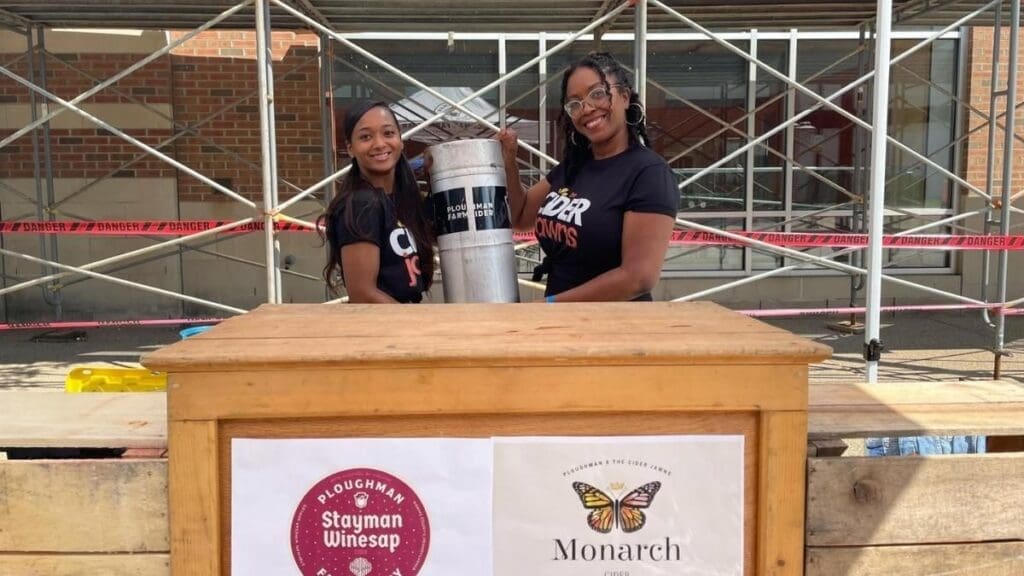
Ashley Johnson & Jasmine Mason: Cider Industry Expanders
Philadelphia-based Ashley Johnson and Jasmine Mason — known collectively as The Cider Jawns — champion diversity in the cider industry through sharing their personal cider journey.
“We like to show people what we’re drinking and why. Cider is such a vibe and we want to bring that specifically to the Black community where the exposure has been limited,” says Mason. One way they do this is by creating and earning media that centers their experiences as Black women — from curating their own Instagram and TikTok feeds to speaking as panelists and appearing on podcasts and in publications like Prohibitchin’ and Good Beer Hunting.
Another tactic is crafting their own cider. Johnson and Mason have honed their technical skills completing a Hale & True cidermaking class and earning Cider Maker certificates from the Cider Institute of North America. Their primary advice to aspiring makers, however, is to jump in and give it a try: “You will make mistakes … and that’s OK,” says Mason. “The first time we racked our cider, most of it ended up on the kitchen floor! It happens.”
Collaboration plays another key role in achieving their mission. The pair partnered with Aspers, Pennsylvania–based Ploughman Cider to create a special release to debut at the 2022 Barrel & Flow Fest, a festival celebrating the Black community. The result was Monarch, a blend of apples and yellow plums from Three Springs Fruit Farm — Ploughman’s Pennsylvania orchard — and ginger from Queen’s Farm, another Pennsylvania grower.
Looking ahead, The Cider Jawns are continuing to hone their craft while seeking out mutually beneficial relations that serve their audience and support positive growth within the industry. More opportunities to curate experiences and spaces would mean more chances to center cider producers and customers who are too often overlooked.
Jasmine Mason’s Pick: Ploughman Cider’s Birdwatcher
Mason says this refreshing seasonal blend of apples and peaches is fruit-forward without being too sweet. “It’s literally perfect.”
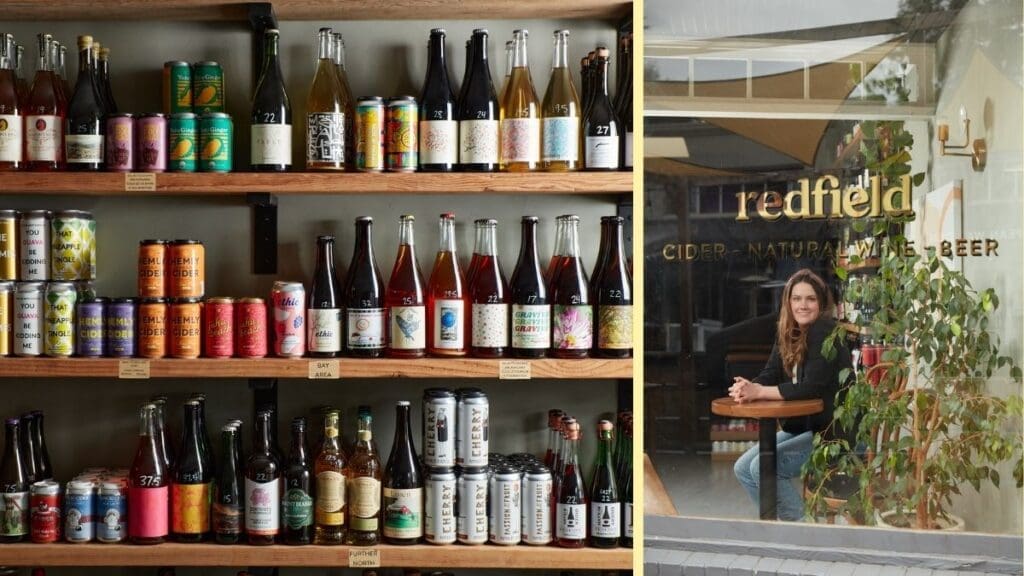
Olivia Maki: Cider Marketing Maven
“Do less, better.” That’s Olivia Maki’s advice to her cider peers — and to herself. With a background in marketing and communications, Maki appreciates how the basic bedrocks of human connection like storytelling can do so much to uplift the industry she loves. As co-owner of Oakland, California’s Redfield Cider Bar & Bottle Shop; founder of Olma Creative Agency; and chair of the Antiracism, Equity and Inclusion Committee for the American Cider Association, Maki is constantly reminded how cider is, at its core, an agriculture product made for and by people. “Telling the story of cider and small family farms is one of the best parts of my job,” she says.
While Maki encourages cidermakers to share their stories and passion, she also cautions against making a brand too much of a direct extension of yourself or your individual tastes. Instead, she suggests considering who a brand’s ideal customer may be and working to center them with a consistent and trustworthy brand voice. “It’s important to keep in mind that just because you think something looks great or sounds great doesn’t mean your audience will too.”
And it all comes back to doing less, better. “Speaking as an entrepreneur myself, there is a trend with folks who start their own businesses to try and do everything themselves as a way to save money and work quickly and efficiently,” she says. “One of my biggest lessons learned was to recognize my strengths and accept my weaknesses.” Maki advises leaning into your strengths and cultivating a team to support the areas that are more challenging for you. She points out that hiring help becomes cost effective when it can save time and money and set your brand up for healthy, sustainable success.
When it comes to defining success in her own businesses and career, Maki says, “I’m not thinking about big expansions or ambitious goals, I’m thinking about making a positive impact in our community through many small acts.”
Olivia Maki’s Pick: Eve Cidery’s 2021 Autumn’s Gold
Redfield carries over 100 ciders alongside natural wine and craft beer. In this traditional method sparkling cider, “acid, tannin and sweetness come together in a beautiful way,” Maki avers. A blend of more than a dozen apple varieties including Idared, Ellis Bitter and Bramley’s Seedling, Autumn’s Gold is hand-disgorged and drinks bone-dry.

Kimberly Kae: Cider Terroir Cultivator
In Esopus, New York, on the west bank of the Hudson River, Kimberly Kae has been making small-batch ciders at Metal House Cider with her co-owner and co-maker Matt DiFrancesco since 2009. Originally, Metal House produced cider entirely made from apples they handpicked themselves. Since then, they’ve adjusted their approach, but remained true to their guiding methodology.
“We started with only untreated apples, picking from nearby orchards long out of production. It is still our conviction that the less conventional intervention in the fruit, the better the cider,” Kae explains. “However, we quickly learned that this does not a steady stream of fruit yield!”
To achieve greater produce stability, in 2017 Metal House started managing a historic orchard in Esopus. The fruit from these 900 or so trees ranging from 50 to 130 years old makes up the bulk of their cider base, supplemented by wild fruit foraged in the Catskills and apples grown within a 20-mile radius by farmers using methods they trust.
In addition, Metal House planted over 200 cider-apple trees in 2019 and 2020, and has plans to plant another 100 trees this year. “We are focusing on what was once here and fell out of favor,” Kae says. “Newtown Pippin, Esopus Spitz — which of course, originated here in Esopus — Northern Spy, Lady, Rhode Island Greening, Golden Russet, Roxbury Russet.” She envisions a future where additional land offers Metal House the opportunity to open a tasting room and make a greater investment into farming practices like silvopasture — integrating and managing domesticated plants and animals to thrive harmoniously.
In the meantime, however, Kae appreciates what they receive from the land Metal House manages. Located between the Hudson lowlands and the tip of the Marlboro Mountains, Metal House Cider’s current orchards lie between the Shaupeneak Ridge and the Hudson River. The result is acidic soil that’s a combination of silty loam and loamy sand offering fertile growing conditions. This isn’t the only geographical feature, however, that makes Kae so passionate about working hyper-locally. Warm air currents from the Atlantic offer relatively cool summers and mild winters, and air currents from the Hudson flanked by hills means good air circulation. “All of which has spared us from most of the problems related to these bouncy winter temps followed by late hard frosts over the past few years,” says Kae. Her admiration for and cultivation of the unique benefits and eccentricities of the region shines through in the glass, providing an alluring taste of the Hudson Valley.
Kimberly Kae’s Pick: Metal House Cider’s 2017 Ammir
This disgorged and dosaged cider was aged almost five years on the lees. Kae describes Ammir as, “somewhat austere, very elegant.”

